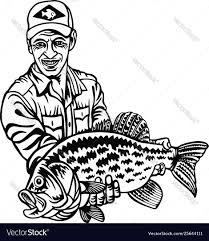The lucky fisher man
In the olden days, there were no hooks or casting nets, so that when the natives wanted to catch fish they made baskets and set traps at the riverside.
One man named Akon Obo, who was very poor, began to make baskets and traps out of bamboo palm, and then when the river went down he used to take his traps to a pool and set them baited with palm-nuts. In the night the big fish used to smell the palm-nuts and go into the trap, when at once the door would fall down, and in the morning Akon Obo would go and take the fish out. He was very successful in his fishing, and used to sell the fish in the market for plenty of money.
When he could afford to pay the dowry, Akon Obo married a woman named Eyong, a native of Okuni, and had three children by her. The eldest son was called Odey, the second Yambi, and the third Atuk. These three boys, when they grew up, helped their father with his fishing, and he gradually became wealthy and bought plenty of slaves.
At last Akon Obo joined the Egbo society, and became one of the chiefs of the town. But he and his sons still continued to fish. Until, one day, when he was crossing the river, a tornado came on very suddenly and capsized the canoe, drowning the chief.
When his sons heard of the death of their father, they wanted to go and drown themselves also, but they were persuaded not to by the people. After searching for two days, they found the dead body some distance down the river, and brought it back to the town. They then called their company together to play, dance, and sing for twelve days, in accordance with their native custom, and much palm wine was drunk.
When the play was finished, they took their father’s body to a hollowed-out cavern, and placed two live slaves with it, one holding a native lamp of palm-oil, and the other holding a matchet. They were both tied up, so that they could not escape, and were left there to keep watch over the dead chief, until they died of starvation.
When the cave was covered, the sons called the chiefs together, and they played Egbo1) for seven days, which used up a lot of their late father’s money. When the play was over, the chiefs were surprised at the amount of money which the sons had been able to spend on the funeral of their father, as they knew how poor he had been as a young man. They therefore called him the lucky fisherman.
Hope you enjoyed the story,
You can follow us up to get our latest update by clicking the subscribe button at the top ending ☝️☝️of the page,or follow us on Facebook on,
If you have any questions please feel free to ask me in the comments section below 👇👇,

Comments
Post a Comment